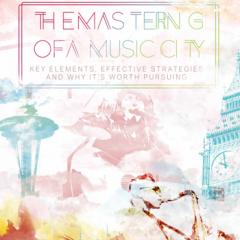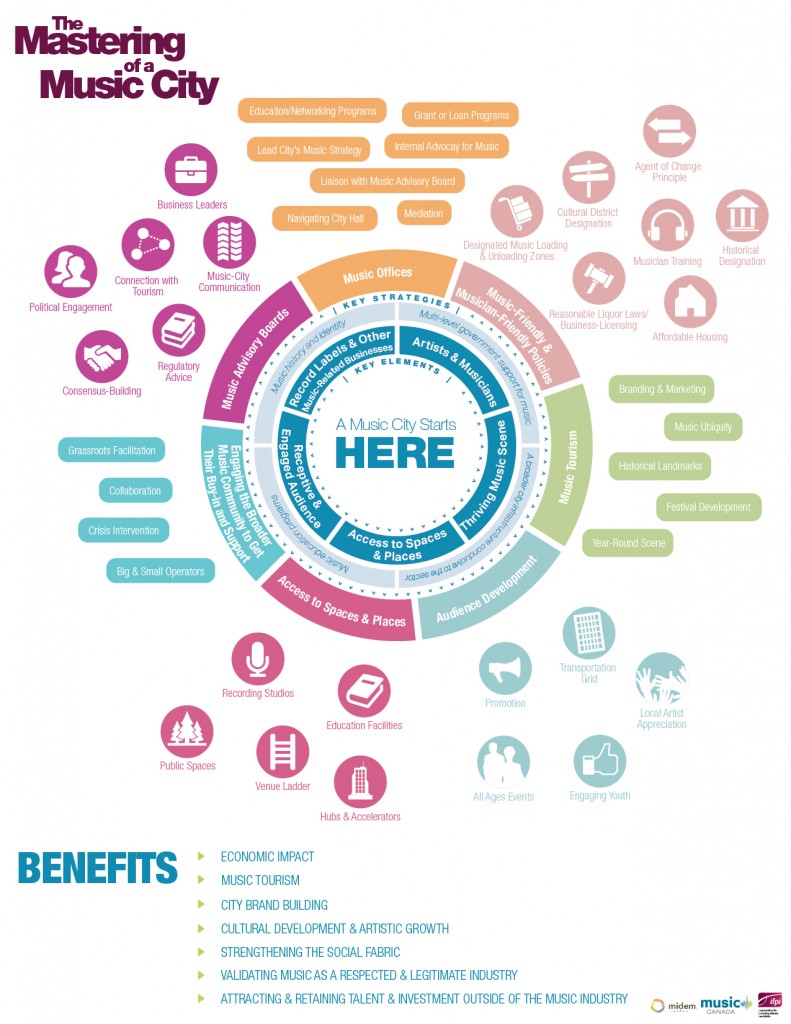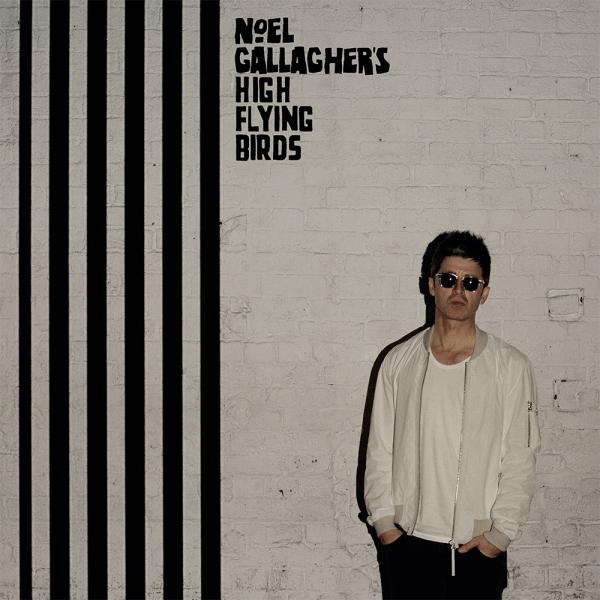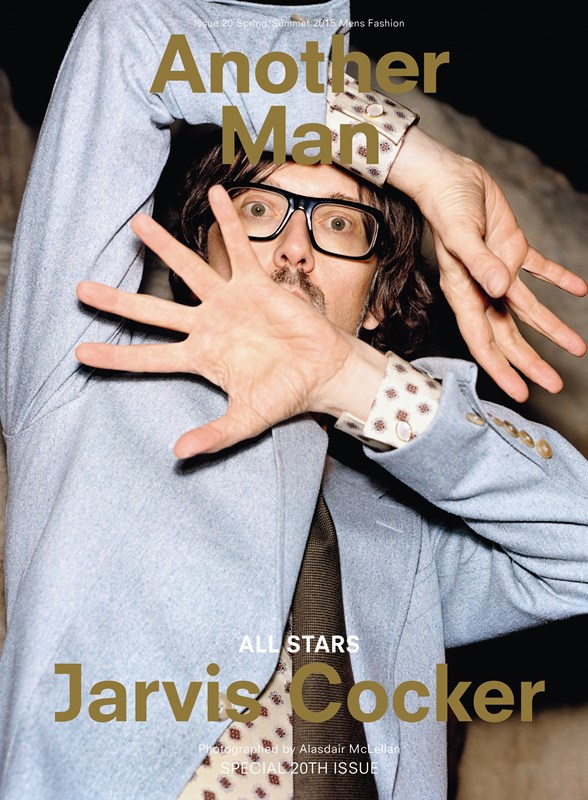For the first time in 2014, streaming drove mainstream music consumption. Discover the vision of TIDAL’s Chief Investment Officer on how streaming becomes a mainstream part of the modern music business, helping to create a powerful industry and bringing it back to sustainability.
7 ways for cities to boost their music economy
A report published by Music Canada and IFPI, in partnership with Midem, looks at how a vibrant music economy can generate a wide array of benefits for cities, from economic growth, job creation, and increased spending to greater tax revenues and cultural development.
The Mastering of a Music City was launched at Midem, the world’s largest music industry conference.
The report provides a simple checklist to help local authorities, businesses, community groups and the creative sector capitalise on the potential of music to build, grow and strengthen their cities.
It cites examples from 22 cities from all continents to explain what a music city is, why it is beneficial, and – critically – the most effective strategies and policies that can be implemented to nurture active music hubs.
Graham Henderson, President and CEO, Music Canada, says: “A vibrant music sector delivers an extensive array of social, cultural and economic benefits to its community; from job creation and retention to city identity and music tourism, to social cohesion, music can play an essential role.”
“Communities of any size, anywhere in the world, can assess the extent to which they have the essential ingredients for a Music City, and deploy the strategies successfully used in the likes of Nashville, Melbourne, Toronto, Berlin and other renowned Music Cities, in order to enhance or grow theirs. These strategies don’t necessarily require heavy investment – addressing red tape and establishing dialogue between leaders in the music community and city officials are inexpensive ways to grow music’s contributions.”
The Mastering of a Music City has identified recommendations in seven strategic areas that are an effective means to grow and strengthen a city’s music economy:
Music and musician-friendly policies, from licensing and liquor laws to parking and planning regulations to affordable housing and artist entrepreneur training.
The creation of Music Offices to help musicians and music businesses navigate the broad range of government policies and regulations that impact music.
The formulation of Music Advisory Boards to engage the broader music community in a collaborative way and to facilitate dialogue with city governments.
Engaging the broader music community to ensure the people most affected by music policies are involved and informed.
Access to spaces and places for artists to practice, record, and perform at every stage of their career.
A focus on audience development, ensuring that there is an engaged and passionate audience for local musicians as well as international touring artists, now and into the future.
Music tourism or the development of a Music City brand to leverage a thriving live music scene, rich music history, or large music festivals in order to reap the significant benefits associated with music.
In addition, multi-level government support for music, a broader city infrastructure conducive to the sector, music education programmes and efforts to highlight music history and identity are important.
Frances Moore, Chief Executive, IFPI, comments: “We’re delighted to be a partner in the Music Cities project, and we will work with our affiliates in 57 countries to spread the good work that Music Canada has been doing elsewhere in the world. They will be taking this report into City Halls worldwide, recognising that each place has different needs and priorities, but urging leaders to seize the common advantages offered by a growing music economy.
“We realise this will benefit the recording industry too, and that is the other reason we are co-sponsoring the report. Our job at IFPI is to improve the environment in which our member companies operate and this is one way that we can do that. Just imagine a world where you can go from country to country and find music cities in every one. That would be good for artists, good for record companies, good for city leaders and good for the wider public that just wants to enjoy great music.”
The Mastering of a Music City was produced after more than 40 interviews with music leaders, city and tourism officials, international focus groups and secondary research. It cites best practices and case studies from 22 cities. IFPI’s affiliated national groups will share the report globally to assist municipal leaders and other stakeholders to develop local music strategies.
You can download the report here.
The Unbelievable Hot Scots Drum Line Is Astounding
If you’re ever in an argument on why music needs to be continued in schools, just show them this. The arts have an impact on test scores, increased hand-eye coordination, helps with math, and keeps kids out of trouble (until they, you know, start to join rock bands in their 20s). The Hot Scots of Lake Howell High School put this routine together in a week and, with over 6 million views so far, the joy lives in their faces.
The Strangest Headphone Ad You’ll Ever Watch
Strength & flexibility are crucial aspects for long-lasting Headphones. Enjoy the long-lasting durability of Sennheiser’s Urbanite headphones because their strength & flexibility are just what your ears desire. At least that’s what this strange and awesome commercial tells us.
https://youtu.be/Lvpi6KZK2NE
Carrie Brownstein’s Memoir, ‘Hunger Makes Me a Modern Girl,’ Will Be Out In October
Penguin has released information on Carrie Brownstein’s memoir, and it will get released on October 27, 2015. Hunger Makes Me a Modern Girl is from a leader of feminist punk music at the dawn of the riot-grrrl era, a candid and deeply personal look at life in rock and roll.
Before Carrie Brownstein codeveloped and starred in the wildly popular TV comedy Portlandia, she was already an icon to young women for her role as a musician in the feminist punk band Sleater-Kinney. The band was a key part of the early riot- grrrl and indie rock scenes in the Pacific Northwest, known for their prodigious guitar shredding and their leftist lyrics against war, traditionalism, and gender roles.
Hunger Makes Me a Modern Girl is the deeply personal and revealing narrative of Brownstein’s life in music, from ardent fan to pioneering female guitarist to comedic performer and luminary in the independent rock world. Though Brownstein struggled against the music industry’s sexist double standards, by 2006 she was the only woman to earn a spot on Rolling Stone readers’ list of the “25 Most Underrated Guitarists of All-Time.” This book intimately captures what it feels like to be a young woman in a rock-and-roll band, from her days at the dawn of the underground feminist punk-rock movement that would define music and pop culture in the 1990s through today.
Calvin & Hobbes Creator Bill Watterson On Why Hobbes Is A Tiger, And The Lasting Impact Of The Cartoon
At the very beginning, why did you decide to make Calvin’s stuffed animal a tiger versus a bear or some other animal? Was there a particular reason?
Bill Watterson: I don’t think there was a lot of thought in that either. I wanted something less conventional than a bear. For Calvin, it should be a bit unusual. But I probably spent all of five minutes thinking about it. Once I hit on a tiger, of course, it was great — cats and I have a certain rapport, so this was a very natural fit for me. Maybe Hobbes could have been some other animal, but he arrived as a big cat, and that expanded my connection with him. Hobbes was as much my alter-ego as Calvin was.
Are you surprised that the strip continues to enjoy such immense popularity so long after you stopped drawing it, and do you have any thoughts about why it’s had such lasting impact?
Bill Watterson: It seems the less I do and say, the better everyone likes my work! (laughter) So, no, I don’t understand it at all! I honestly assumed that the books would go out of print within a few years, once they didn’t have the strip in the newspaper to create the readership for them. But people kept buying the books anyway, and now parents are showing them to their kids, and a new generation is coming up reading the strip. That’s something I never anticipated at all.
As for why it continues to speak to people, I don’t really know. I always tried to make the strip entertaining on several levels, so one aspect might appeal even if others don’t. But really, I was writing to amuse Melissa (my wife) and myself. That’s as far as I understand.
Via Jenny Robb, curator and associate professor at the Billy Ireland Cartoon Library & Museum at The Ohio State University in an in-depth interview in “Exploring Calvin and Hobbes: An Exhibition Catalogue” (Andrews McMeel Publishing).
The Best Of The Disappointed Comments With Abbey Road On TripAdvisor
You would think if you’re going to go to world’s most famous zebra crossing in Abbey Road, you’d be really happy.
But going on TripAdvisor, you’ll see some have branded it ‘extremely disappointing’, ‘smaller than you imagine’ and ‘just a street.’
The London crossing became a must-see site for fans after The Beatles were photograpped walking across it for the cover of their 11th studio album.
Why There Are No Bands Anymore, According To Noel Gallagher
“What has become apparent to me is that we live in ridiculous f***ing times now. The music that’s being made now is so f***ing bland. It’s nice and kind of meaningless and then you turn on the television and the news is so savage! The music doesn’t reflect the times at all.
“I hear Radio 1 in the morning when the kids are up and going to school and it’s just bland, meaningless, mindless pop music and then the news is: ‘The World Is Going To End!’ What’s going on? The music of George Ezra: Wow!”
“I was talking to a mate recently who’s been in various bands and I was asking what he was doing and he was saying, ‘I’m trying to do my own stuff now.’ I said, ‘You should be in a band, you look great,’ and he said, ‘Nobody wants to be in bands any more, everybody wants to be a singer-songwriter.’ That’s his generation. Everyone wants to be Jake Bugg or George Ezra. The band thing is dying out.
“I blame it on the lack of rehearsal rooms and the lack of little tiny studios because it’s easier for a guy to sit at home with a tape recorder and send it to a record company than it is for a band.
“Back in my day, we used to go down the rehearsal room when it was 20 quid a night, or whatever it was, and you bash it out. Everybody’s got a home recording studio on their iPhone now. All the cheap studios and venues are going to go soon. You’re going to either be stuck at the bottom in [London pub venue] the Boston Arms or you’re going to be catapulted to the top at The O2 and there will be nothing in between.”
Jarvis Cocker Of Pulp Gives His Manifesto For A New Age Of Creativity
Jarvis Cocker, the Britpop frontman for Pulp, revealed in Another Man Magazine his manifesto for a new Stone Age of creativity:
NU-TROGLODYTE MANIFESTO
Where can you find peace?
Where can you find total silence?
Complete darkness?
Here.
No phone reception.
No wi-fi.
No TV.
No radio.
This is the real sound of the Underground: (cos it is, y’know actually underground)
No outside influences whatsoever.
A blank canvas.
Well, not exactly blank – look at those walls: what do you see when you look there? Can you see faces? Patterns? They’re not really there you know – just like there aren’t any scorpions or bears or hunters up in the night sky. No, they’re just dot-to-dot pictures invented by some forgotten caveman. The universe is random: only man tries to give it a pattern. To make it mean something.
But aren’t these patterns good enough as they are? Without any interpretation? And wouldn’t you love to be able to make something as beautiful as this? Of course you would. But no one made it: it just happened.
Stalagmites
Stalactites
Which is which?
“Tights come down” – (a crude but effective way to remember)
These things take over 20,000 years to form, you know.
And I thought I was a slow worker…
Is it a coincidence that the club that gave birth to the most significant and influential musical group of the past century was called “The Cavern”?
I don’t think so.
And why are all the best nightclubs in dark, dingy basements with low ceilings?
Easy:
Because it reminds us of being here… Back in the cave. I mean – c’mon: why do you think it was even called “Rock Music” in the first place?
This is where it all began
A member of your family once lived here
The original Des-Res
Now it’s time to come home
Time to come back to the source
Time to escape the constant, endless, meaningless jabbering that distracts you from who you really are and what you really want to do.
There’s room to think in here
Room to live
Come in (mind your head)
Sit down
Stare at a rock
Let’s start all over again.
You Need To Read Toni Morrison’s Advice On Failure
As a writer, a failure is just information. It’s something that I’ve done wrong in writing, or is inaccurate or unclear. I recognize failure—which is important; some people don’t—and fix it, because it is data, it is information, knowledge of what does not work. That’s rewriting and editing.
With physical failures like liver, kidneys, heart, something else has to be done, something fixable that’s not in one’s own hands. But if it’s in your hands, then you have to pay very close attention to it, rather than get depressed or unnerved or feel ashamed. None of that is useful. It’s as though you’re in a laboratory and you’re working on an experiment with chemicals or with rats, and it doesn’t work. It doesn’t mix. You don’t throw up your hands and run out of the lab. What you do is you identify the procedure and what went wrong and then correct it. If you think of [writing] simply as information, you can get closer to success.















